- Home
- Michael Dobbs
The Touch of Innocents Page 11
The Touch of Innocents Read online
Page 11
Her nightmare had returned, and now she could almost touch it.
FOUR
Friday. Devereux was delivered home late that night by his Ministerial car and its Special Branch driver. Izzy had retired but was not yet asleep – how could she sleep? From a biographical dictionary taken from the shelves in his study she had identified many of the new pieces, for there are few private pieces in a public life.
Outside Downing Street, the father: ‘Rt Hon Sir Francis Nugent Devereux, Kt, PC, MP; MC; b 1914, d 1966; o s of Patrick Nugent Devereux, qv; Educ: Eton; Jesus Coll. Oxford … Minister of Education (1955–57); Pensions (1957–60); President, Board of Trade (1960–62); Minister of Defence (Apr – July 1962).’
After July 1962 there was nothing but his death. A beginning steeped in both privilege and prospects which had led to an end as sudden and complete as the progress had been glittering. Illness, perhaps.
There was a mother, too, bride of Francis Nugent, who had died young, with Paul no older than ten.
And under Paul Devereux’s own listing a wife: ‘m 1970, Arlene Fitch-Little (d 1980)…’
Tragedy and early death seemed to run in the family, at least through the women. And he had never remarried. Only one child, a dau. ‘Paulette, b 1974.’ It didn’t state that she had blonde hair or large, frightened eyes and was last seen holding a baby, it didn’t have to. She was the right age, early twenties, from the right family. A daughter named after himself, in his own likeness, the child an extension of the father. She wondered just how alike they might be.
Yet again she told herself that she was submerged in self-delusion, the daughter was no more than an image in a dream. But the dream was a nightmare, inextricably intertwined with her other nightmare centred upon Bella’s death. Or disappearance. Somewhere, deep within the jumbled recesses of her mind, a connection was being made which she did not yet understand but whose message was unmistakable. Find his daughter; find her own.
Yet, if the Devereuxs were involved, why, for God’s sake why, had he invited her into his home?
It was easier to believe in concealment than coincidence, but concealment of what? Shame? Guilt? His daughter? There were secrets in this family which hid the truth not only about themselves but also about Bella.
Yet what was she to do? To confront? To run? She had nothing to confront him with and, if he were concealing something, she had much more chance of revealing it by staying close than by leaving. So long as he did not know she suspected. Anyway, where could she run?
And perhaps he, too, was merely a victim of circumstance, a player trapped as innocently as she within a web that seemed to be enmeshing their two families. It was not a time for rushing to judgement.
She slept fitfully, uncertain whether she had accepted his hospitality or entrapment, whether his hand was extended in charity or restraint, and it was the following evening before she had an opportunity even to talk to him. Saturday was no day of rest for a politician; he had left the house early and was clearly wearied by the time he returned.
He disappeared into his study accompanied by a tumbler full of whisky, not reappearing for a full twenty minutes. When he did so, he seemed more relaxed, the tension gone from his shoulders, as though he had undergone some form of therapeutic treatment. Cleansed, almost. He noticed her inquisitive expression.
‘My diary. I keep a political diary. Wonderfully invigorating. Like war. Loading the ammunition, aiming the guns at targets which don’t even know they’re in the firing line, waiting to blast them out of the water – when the time is right.’ He adopted an expression of well-rehearsed theatrical gravity. ‘In reality political diaries are a pathetic attempt by their authors to secure immortality, to record the lies they wish they had told at the time rather than the lies they actually told, to claim the triumphs of others for themselves and to distribute the fruits of failure as widely as possible amongst their colleagues.’ His blue eyes lit with amusement. ‘Helps keep me sane.’
The eyes lingered on her, longer than was necessary for the appreciation of the joke, still amused, challenging.
‘How about I take you to dinner – unless you’ve made other arrangements, of course?’
He knew she hadn’t.
‘Sally will keep an eye on the sprog,’ he offered.
She was exhausted, had no appetite, but Benjy was sleeping soundly and she did not hesitate.
Le Petit Canard was a small French-Canadian restaurant, an oddity in the back lanes of Wessex, situated in an old coaching inn at the ancient crossroads which bisected the village of Maiden Newton. She wondered who had been the Maiden Newton, and why they had named an entire village after her.
The plaster was old and crumbly, the beams low and the cedar wood fire filled the air with a musky fragrance. The cuisine was exceptional, a mixture of Pacific-rim creations, reflecting the chef’s extended and adventurous youth spent dressing poultry and impressing waitresses in a dozen different ports.
The chef’s wife, who was in charge of the liquid side of affairs, proffered a wine list, but Izzy declined. A fine vintage could achieve many wonders; repairing brain damage and unscrambling the mind were scarcely amongst them. So Devereux had agreed to split the bottle with the chef’s wife, with whom he spent several animated moments discussing the merits of an ’85 Vosne-Romanée, Suchots – ‘lovely legs, lots of flesh, goes a long way’, as the tasting notes pointed out – and an ’86 Cabernet Sauvignon from the Californian Napa Valley – ‘Nosegasm’. He chose the American wine.
‘In your honour,’ he revealed to Izzy. ‘Oh, and a bottle of Dorset sparkling water,’ he insisted. ‘Has to be home grown, one of the Prime Minister’s great passions. Water. Though on reflection, perhaps nowadays it’s his only great passion,’ he added in a tone that she took as almost contemptuous dismissal of his leader. He was confiding in her, sharing secrets, drawing her in. As the great cedar fire had diminished, he had grown mellow. And perhaps a little vulnerable.
In another corner sat a couple, he with wedding ring, she without, all eyes and ovaries. For a wistful moment Izzy reflected on how long it had been since she had been part of that chase, out to impress, to kill, to make herself irresistible. Too long. Quickly she thrust the thought out of her mind.
‘Your new job must be exhausting,’ she offered weakly.
‘Exhilarating. More exhilarating than exhausting.’ He poured another glass of wine, well over his fair share of the bottle, relaxing. ‘And I’ve many family reasons for wanting this in particular. My father once held this same position, more than thirty years ago, and I feel as if I have to …’ He was about to say ‘bury a few ghosts’ but instead chose to mutter some homily about finishing his father’s work.
‘How’s the Duster?’
‘Ah, at work, are we?’ He raised a disapproving brow. The wine was getting to him, lending an exaggerated edge to his character.
‘No, not at all. But more than idle curiosity. I, too, have family connections. My husband is deeply involved in the project.’
‘Mmmm,’ he considered. ‘And tell me. Are you very deeply involved in your husband?’ he asked bluntly. ‘Or is that too rude a question?’
‘Not particularly. And probably. In that order.’
‘Small world,’ he said reflectively. ‘That your family and mine should cross paths so … A very small world.’ He swirled the dark red liquid around his glass, lingering on its aroma before drinking deep. ‘So, the Duster. To you professionally, Miss Dean, I offer an absolutely frank and forthright “No comment”. But to you privately, Izzy …? We’re making progress. Nothing more, but certainly no less. It’s now down to the politics of it rather than the finances, and since political positions come cheap, I’m confident the deal will be done. Your husband should be content.’
He had flattered her with a confidence, but Izzy struck him as being remarkably underwhelmed by the news. Her mind seemed elsewhere.
‘Talking of family,’ she asked, ‘was that your father? Amongs
t the photographs on your piano?’
He nodded.
‘And your wife, I assume.’
‘My wife died. Many years ago.’
‘I’m sorry.’
His mood had grown sombre; she felt she was intruding. But she could not stop.
‘And your daughter?’
He became more animated, wanting to say more, seemingly unable to find the appropriate words. ‘My daughter … lives away from home.’ And no more until: ‘Families can be a rock, Izzy, on which you build your life. Or on which your whole life is dashed.’ There was a heaviness in his reply which discouraged further questioning, as though a great weight were about to topple and crush him. She did not doubt that his pain was genuine.
‘You must be very lonely at times.’ She didn’t mean it to sound like a come-on, but she hadn’t intended to feel sympathy for him, either.
‘There are … compensations. My job, for one.’ He made a conscious effort to lift his mood. ‘And distractions. I’m well connected. A widower. My own house. Nice car.’ He was mocking himself. ‘Some women seem to find that …’
‘Intriguing?’ she suggested.
The blue eyes were looking directly at her now, searching, challenging; he was delighted when she returned his stare. She wasn’t going to back down, run away. The point had been made, his interests registered; he changed the subject.
‘Tell me, why did you choose your career? Unusual job for a woman.’
What a question. How could she tell him? She wasn’t sure herself. A fascination with Man’s folly? Admiration at his ambitions and achievements? Folly, it was more the folly, the soaring heights which leaders and nations coveted and the pride, the hubris which always brought them low. And her conviction that the world needed to know about it all, whether the world gave a damn or not. Usually not.
But it was more than that. She remembered it clearly. The day shortly before Christmas, 1968.
It was a time when America was preparing to set foot on the Moon and was about to reach its nadir in Vietnam. Richard Nixon had just been elected President, a man who would reach for unprecedented heights around the world, breaking down the doors of Communism, yet whose folly and false pride would bring him wretchedly low. A time of inspiration and involvement, of earthquakes which brought down political mountains around the globe.
But that was not what she remembered. Izzy was little more than ten, a schoolgirl living a comfortable but undistinguished life in an undistinguished suburb of Respectability, Mid-America.
It had been a quiet day. Too quiet. Izzy had known something was amiss, her normally tranquil mother was increasingly enveloped in agitation, but her gentle enquiries had been rebuffed and Izzy herself increasingly ignored, until shortly before the lunch hour. Izzy remembered being borne along, unnoticed, in the turbulent wake as her mother moved from the kitchen towards the dental surgery that Izzy’s father had built on the side of their undistinguished clapboard house. Her mother had swept past the empty desk where the recently hired receptionist should have been, where files and dental charts lay abandoned, and through the door that led to the surgical inner sanctum – the mother, agitated, unaware that the child was following; Izzy, unsighted, having difficulty in seeing around the back of the large dental chair, able only to glimpse her father’s bald head protruding above it, ruddy and flushed, his legs astride. The child had barely enough time to wonder why those legs wore only socks and suspenders. She was quite unable to comprehend why a separate pair of naked legs appeared to be hooked over her father’s shoulders.
All that Christmas they had sat in silence, watching the tree and the marriage dying. By New Year it was separate bedrooms.
Izzy had adored her father, his smile, his laughing eyes, the enchanting and extravagant tales he told while seated on the end of her bed, weaving pictures of another world that lay beyond mundane Respectability. And she had never again trusted a man in authority.
‘Jules Verne,’ Izzy addressed Devereux. ‘It was bloody Jules Verne who made me become a foreign correspondent. Loved his books. Read them all. Hated him because the only role he gave to women was to wave their hankies and wait patiently at home while the menfolk went off round the world in search of adventure.’
‘He was a Frenchman,’ Devereux responded, as if that explained all shortcomings.
‘Are Englishmen any different?’
‘Some are,’ he mused. ‘How many have you known?’
‘My grandfather,’ she replied, deflecting his innuendo. ‘He was English. From this part of the country. That’s why I came here. I think. Something about going back to my roots, trying to find out who I really am, and what matters most to me.’
‘Perceptive of you. We can’t escape our roots. Links in a long, unending chain, you know, one generation to the next. We can twist ourselves, change the shape a little, but in the end so much of us is what we were born. That’s why we blame our parents; why we bear so much responsibility for our own children. They are what we have made them.’
His voice had grown very subdued, his eyes more watery and distant. For the first time, Izzy sensed he was revealing a little of his inner self. He carried his family obligations like a great load that had bent his back and, at times, brought him low. She had sympathized with him, now she could identify with him.
‘You sound … almost as if you have lost your children.’
‘I have only one. My daughter.’
Izzy could feel a coil winding within her.
‘And our relationship is not what I would want.’ He clenched his jaws, keeping tight rein on himself. Stiff upper lip. ‘My fault, probably. Too busy for her problems. She needed a mother; perhaps I should have remarried, but …’ He shrugged. ‘Hasn’t lived at home for a long time. Funny things, families.’
The damp blue eyes swam with pain and he reached out for support, to draw strength from her. She let his hand remain on hers; he had touched something inside her, too. They were two lonely people, sharing pain about something they had in common and cared very much for. Family.
She knew he wanted her. And she hadn’t the slightest idea how she would respond.
‘Tell me about your daughter.’
The question hung over them. He stared fixedly, remembering, struggling with something. Then a door closed inside. He sat up straight and withdrew his hand.
‘No, not now.’ He shook his head as though to clear it of sorrows. ‘Perhaps later.’
He had taken control once more and she knew it would be foolish to press him, for the moment, at least. As he said: later.
‘Later’ came as he opened the creaking oak door which led into the great hall of his home. The long room was lit only by the glow of a banked fire in the inglenook. As they entered he took her wrist, turned her, brought her into his arms, and she did not resist, even when his lips sought hers. She wanted him, even though she could not trust him.
His body pressed into her, she could feel him hardening, his hands moving round from her back to find the softness of her breasts. No objection – how long had it been since someone had sought her like this, since she had smelt the heat of a man? She needed him, too. For all sorts of things.
But most of all for Bella.
Was his attention cover-up? Or coincidence? Her suspicions struggled with her lust.
‘Paul …’ She drew her head back, but his tongue still pursued her. She had to test him, not knowing how, confused by her own feelings. His body was still hard against her.
‘I’m not sure I’m ready for this. So soon after the accident.’
‘You’re ready. I can feel you’re ready.’
‘Perhaps we should get to know each other a little better,’ she whispered, but her body displayed no such caution, pressed into him, egging him on. He was right, she was ready. And he was on fire, youthfully impatient. He would have her on the nearest chair.
‘I need a little more time,’ she gasped as his fingers manoeuvred like scouts across a battlefield. Soon she
would have let him go too far easily to stop him, if he insisted. ‘I want to help you, Paul, with everything.’ A button gave way and rattled across the floor. ‘Everything, Paul.’ Time to test him. ‘Even with your daughter, Paulette.’
And against her she felt his desire ebb. The moment was gone.
‘Izzy, we’re both consenting adults, let’s be realistic. God’s sake, you’re going home. Now is the time, the only time. Or was.’
He attempted a smile as she adjusted her clothing.
‘Don’t worry,’ he added, ‘I do understand. Hope I haven’t embarrassed you.’ The English gentleman again.
‘Maybe there is time, Paul. I’m not sure I should rush anything. Even going back home.’
‘What?’
‘I might stay.’
In the darkness it was difficult to see the anxiety creep across his face, but she felt him tense. Then he drew back and there was no contact.
‘I’m told you’re making excellent progress. Surely home is the best place. Complete your recovery.’
‘Home is where the pressure is. And the job. I could do with the break. Just a week or so longer.’
‘I’m really not sure that would be wise, Izzy. The doctors know best, you should listen to them. Home for Christmas.’
‘Maybe.’
His tone was moderate, reasonable, in no way threatening, but in the spitting embers of the fire his eyes seemed wine spilled, a little bloodshot, their liquid turned incandescent. The fire spat once more, casting harsh shadows across his face.
There was a silence, filled only by the scythe-like ticking of the great clock that echoed off flagstones and rebounded from hard plaster walls, counting down to the next move in what had become their game.
She moved her body back towards him, within his reach, offering. He did not respond.
She had to be sure.
She moved again, closer still. This time he retreated.
‘Staying on would create difficulties, I’m afraid,’ he was saying. ‘I have house guests arriving in little more than a week; it would not be possible for you to stay on longer here. I’m sorry.’

 Last Man to Die
Last Man to Die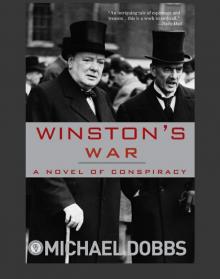 Winston's War
Winston's War The House of Cards Complete Trilogy
The House of Cards Complete Trilogy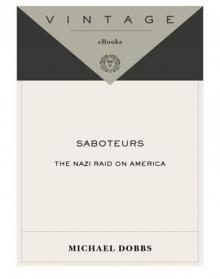 Saboteurs
Saboteurs The Touch of Innocents
The Touch of Innocents WC02 - Never Surrender
WC02 - Never Surrender Old Enemies
Old Enemies Churchill's Triumph
Churchill's Triumph The Edge of Madness
The Edge of Madness Goodfellowe MP
Goodfellowe MP The Final Cut
The Final Cut Whispers of Betrayal
Whispers of Betrayal Churchill's Hour
Churchill's Hour The Buddha of Brewer Street
The Buddha of Brewer Street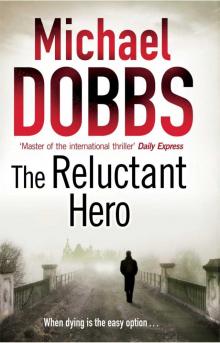 The Reluctant Hero
The Reluctant Hero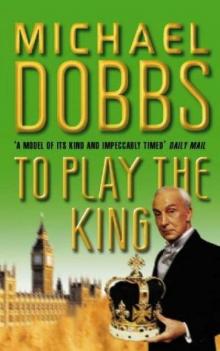 To Play the King
To Play the King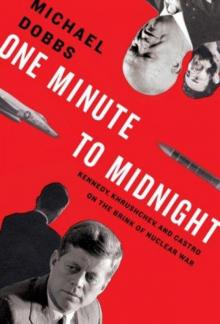 One minute to midnight
One minute to midnight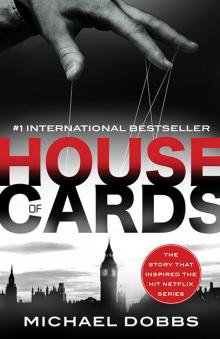 House of Cards
House of Cards The Lords' Day (retail)
The Lords' Day (retail) Whispers of betrayal tg-3
Whispers of betrayal tg-3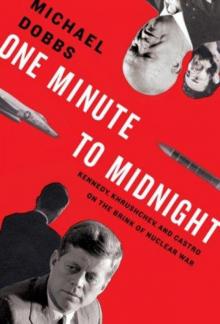 One minute to midnight: Kennedy, Khrushchev, and Castro on the brink of nuclear war
One minute to midnight: Kennedy, Khrushchev, and Castro on the brink of nuclear war The Final Cut fu-3
The Final Cut fu-3 To play the king fu-2
To play the king fu-2 A Ghost at the Door
A Ghost at the Door A Sentimental Traitor
A Sentimental Traitor